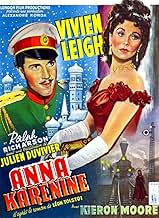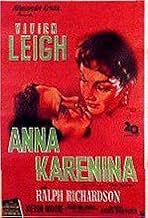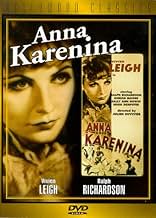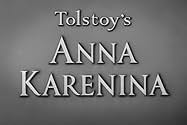CALIFICACIÓN DE IMDb
6.6/10
3.1 k
TU CALIFICACIÓN
Agrega una trama en tu idiomaA married woman's affair with a dashing young officer has tragic results.A married woman's affair with a dashing young officer has tragic results.A married woman's affair with a dashing young officer has tragic results.
- Dirección
- Guionistas
- Elenco
Niall MacGinnis
- Levin
- (as Niall Macginnis)
Opiniones destacadas
Rumor had it that Vivien Leigh was not anxious to take on the remake of "Anna Karenina" partly because she had just recovered from tuberculosis, and maybe also because the ghost of Greta Garbo was too real. But she had one film left to do for Alexander Korda, and this was it. "Anna Karenina" released in 1948, stars Leigh as the tragic Anna. The story is based on Tolstoy's novel. Anna meets a handsome colonel, Count Vronsky (Kieron Moore) and falls in love with him. The trouble is, she is married to a high-level Russian bureaucrat (Ralph Richardson) and has a son. Anna's husband is a self-absorbed politician type, somewhat cold and aloof, consumed with his image in Russian politics. He sees marriage as a "duty" something he says a few times. Anna runs away with Vronksy, a horrendous scandal at the time and probably still would be today. It all ends tragically. Comparisons between this film and the 1935 one are inevitable. While both films are respectable, I prefer Viven Leigh's performance of Anna. Perhaps it was because Leigh had her own personal demons that she made this part so amazingly real, as she would in "A Streetcar named Desire" three years later. While I admire Garbo, I did not think of her as a great actress. Too aloof in some ways to believe she would fall head over heels for Vronsky. Ralph Richardson plays his part with consummate discipline; he can only see Anna's betrayal in terms of how it effects him. Kieron Moore is harder to judge. In the first part of the movie, he isn't given much to do except show off his good looks. He does, however, get a few good scenes as the movie progresses, and plays Vronksy as a decent man but also a flawed one. If you only know the 1935 version of this film, at least be open-minded enough to give this remake a chance. For me, Viven Leigh was reason enough for me to see it.
First off, let us concede that neither the 1935 Greta Garbo "Anna Karenina" nor the 1948 Vivian Leigh version comes close to capturing the complexities of Tolstoy's masterpiece. Most significantly, Konstantin Levin and Kitty's relationship, and more particularly, Levin's protracted personal and metaphysical development, are dropped entirely, both screenplays preferring to treat the story as an adulterous romantic triangle with snowflakes instead of palm trees.
That said, what we are left with in both films are masterpieces of film craftsmanship, where the triple triumphs of cinematography, art direction, and costume design are the real stars.
Which is not in any way to lessen the contributions of the cast, who in both instances, make the best of what they have to work with.
Garbo enchants in many of her individual scenes, particularly with Freddy Bartholomew and Maureen O'Sullivan, (as Kitty). Who can forget her advising Kitty to seize her fleeting youth, with its promise of a dream prince to emerge from the blue haze of the mountain top. Equally impressive, is her muted aversion to Alexei Karenin, (Basil Rathbone).
But she fails in her depiction of a fatal love for Count Vronsky (Frederic March). Garbo, with her solemn, majestic and singular self possession--her "Queen Christina" like cerebral detachment, is simply too thoughtful, too deliberate, to in any way convey Tolstoy's impulsive, febrile and thoughtless anti-heroine.
True, she had forsaken all for John Gilbert in "Christina," but that decision was the result of deep and thorough soul searching, and explained with the eloquence of Solomon to her courtiers. In "Camille" she is by profession a lover, and so her ultimate renunciation of Armand, reveals the true depth of her character. But one cannot conceive of her destroying the lives of others to satisfy a whimsical infatuation.
And this is where Miss Leigh's Anna trumps Garbo, for Miss Leigh does successfully transmit Anna's neurasthenic and utterly reckless collapse at the feet of the dashing Count. She seems blown by forces much stronger than she--a daffodil in a windstorm, and light years from Garbo's deep Scandanavian imperturbability.
Given the alleged similarities between Miss Leigh and Anna's disposition, perhaps this is life imitating art. In any case, it is why she makes a truer Anna, and why the role serves as a warm up for Blanche Dubois...
She is also abetted in her interpretation, by the genuinely eerie, recurring, nightmare sequence--with the Charon like, white bearded old man, forever dogging her as he chinks away at the ice. An ill omen indeed ! And Miss Leigh conveys the desperation of her impending doom in every gesture and nuance.
Then too Keiron Moore, (despite being an inferior actor to Frederic March) is much more dashing and handsome as Vronsky--a fact which, at least in terms of audience sympathy, helps explain the attraction.
Strangely, Mr. March who had been so visually appealing as Dr. Jeckyll, just a few years earlier, photographs very poorly in the Garbo version, and is not helped by a buzz haircut.
And as superb as Cedric Gibbons sets and Adrian's costumes are as a backdrop for Garbo, we feel Mr.Andrejew's art direction and Cecil Beaton's designs get the nod here as well, if only perhaps in their European origin, and the deep, appropriately moody nineteenth century shadows with which they are lit and photographed.
However, as visually sumptuous cinematic recreations of a vanished aristocratic world--each version has much to savor, and should be taken in tandem.
That said, what we are left with in both films are masterpieces of film craftsmanship, where the triple triumphs of cinematography, art direction, and costume design are the real stars.
Which is not in any way to lessen the contributions of the cast, who in both instances, make the best of what they have to work with.
Garbo enchants in many of her individual scenes, particularly with Freddy Bartholomew and Maureen O'Sullivan, (as Kitty). Who can forget her advising Kitty to seize her fleeting youth, with its promise of a dream prince to emerge from the blue haze of the mountain top. Equally impressive, is her muted aversion to Alexei Karenin, (Basil Rathbone).
But she fails in her depiction of a fatal love for Count Vronsky (Frederic March). Garbo, with her solemn, majestic and singular self possession--her "Queen Christina" like cerebral detachment, is simply too thoughtful, too deliberate, to in any way convey Tolstoy's impulsive, febrile and thoughtless anti-heroine.
True, she had forsaken all for John Gilbert in "Christina," but that decision was the result of deep and thorough soul searching, and explained with the eloquence of Solomon to her courtiers. In "Camille" she is by profession a lover, and so her ultimate renunciation of Armand, reveals the true depth of her character. But one cannot conceive of her destroying the lives of others to satisfy a whimsical infatuation.
And this is where Miss Leigh's Anna trumps Garbo, for Miss Leigh does successfully transmit Anna's neurasthenic and utterly reckless collapse at the feet of the dashing Count. She seems blown by forces much stronger than she--a daffodil in a windstorm, and light years from Garbo's deep Scandanavian imperturbability.
Given the alleged similarities between Miss Leigh and Anna's disposition, perhaps this is life imitating art. In any case, it is why she makes a truer Anna, and why the role serves as a warm up for Blanche Dubois...
She is also abetted in her interpretation, by the genuinely eerie, recurring, nightmare sequence--with the Charon like, white bearded old man, forever dogging her as he chinks away at the ice. An ill omen indeed ! And Miss Leigh conveys the desperation of her impending doom in every gesture and nuance.
Then too Keiron Moore, (despite being an inferior actor to Frederic March) is much more dashing and handsome as Vronsky--a fact which, at least in terms of audience sympathy, helps explain the attraction.
Strangely, Mr. March who had been so visually appealing as Dr. Jeckyll, just a few years earlier, photographs very poorly in the Garbo version, and is not helped by a buzz haircut.
And as superb as Cedric Gibbons sets and Adrian's costumes are as a backdrop for Garbo, we feel Mr.Andrejew's art direction and Cecil Beaton's designs get the nod here as well, if only perhaps in their European origin, and the deep, appropriately moody nineteenth century shadows with which they are lit and photographed.
However, as visually sumptuous cinematic recreations of a vanished aristocratic world--each version has much to savor, and should be taken in tandem.
Count Tolstoy's massive novels, "War and Peace," and "Anna Karenina" are personally quite challenging.
Here are breathtakingly crafted literary works in a spiritual context of unconstructive energy. It's quite easy to become as entranced within these "worlds" as are many music lovers within the skewed terrain of Wagner's Valhalla and Nibelungens.
Tolstoy's words pull in the reader almost hypnotically as he spins his titanic, subtle tales of societal mores conflicting with human emotions.
Many of his characters are self-absorbed and vain, and his social environments repressive and stolid, with false values that tragically dehumanize and destroy.
So it's an ultimate challenge to attempt to separate these energetic downers from their dazzling technical counterparts.
In the case of "Anna," after stripping away the polished veneer, I find characters trying to cope with their testy emotional choices while being thwarted by inhuman societal standards.
Yet "Anna" is a favorite of filmmakers, having been done countless times, with the Garbo-Selznick version the most notable. Here Vivien Leigh gives a creditable performance of this distraught heroine, with Director Julien Duvivier joining Jean Anuith in script adaptation.
Ralph Richardson and Kieron Moore are both completely substantial, and general production values are attended to with solid professionalism.
Alas, the enactment seldom tugs heartstrings and, in fact, a strangely turgid pall seems to hang over the entire production. Condensing a 900-page novel down to 2-hour running time doesn't help matters.
As for Leigh, my feeling is that she gravitated too often to "fallen woman" roles. While she portrayed them very well, they may have failed to bring her the uplift her personality seemed to desperately seek. Hers was pretty much a career of depressingly joyless female characters, which perhaps worked not to her personal advantage.
That's another matter, though; Leigh was forever the consummate, fine actress, and her legacy is one of great artistic achievement.
This version of "Anna Karenina" remains a thoughtful, worthy attempt at a near-impossible task.
Here are breathtakingly crafted literary works in a spiritual context of unconstructive energy. It's quite easy to become as entranced within these "worlds" as are many music lovers within the skewed terrain of Wagner's Valhalla and Nibelungens.
Tolstoy's words pull in the reader almost hypnotically as he spins his titanic, subtle tales of societal mores conflicting with human emotions.
Many of his characters are self-absorbed and vain, and his social environments repressive and stolid, with false values that tragically dehumanize and destroy.
So it's an ultimate challenge to attempt to separate these energetic downers from their dazzling technical counterparts.
In the case of "Anna," after stripping away the polished veneer, I find characters trying to cope with their testy emotional choices while being thwarted by inhuman societal standards.
Yet "Anna" is a favorite of filmmakers, having been done countless times, with the Garbo-Selznick version the most notable. Here Vivien Leigh gives a creditable performance of this distraught heroine, with Director Julien Duvivier joining Jean Anuith in script adaptation.
Ralph Richardson and Kieron Moore are both completely substantial, and general production values are attended to with solid professionalism.
Alas, the enactment seldom tugs heartstrings and, in fact, a strangely turgid pall seems to hang over the entire production. Condensing a 900-page novel down to 2-hour running time doesn't help matters.
As for Leigh, my feeling is that she gravitated too often to "fallen woman" roles. While she portrayed them very well, they may have failed to bring her the uplift her personality seemed to desperately seek. Hers was pretty much a career of depressingly joyless female characters, which perhaps worked not to her personal advantage.
That's another matter, though; Leigh was forever the consummate, fine actress, and her legacy is one of great artistic achievement.
This version of "Anna Karenina" remains a thoughtful, worthy attempt at a near-impossible task.
How can one possibly turn Tolstoy's novel into a "short" film? Even at 139 minutes in the uncut Korda version so much must be lost. What we end up, sad to say, is a first-rate melodrama without the psychological subtleties of the book. But that's the bad news. On the plus side, we have the sort of lavish the sky's-the-limit big, big, bigger budget production that only the Hungarian Alex Korda could have produced a few years after the world war on the sound stages of London --sets by the Russian Andreiev, costumes by the English Cecil Beaton; deep-focus photography and lighting by the French Henri Alekan ("Belle et Bete"), and music by the English composer Constant Lambert. Technically, this film contains some of the best B&W work ever done in Britian. Perhaps the greatest fault of the film is in the style of the acting. Vivian Leigh is a great beauty, very aristocratic, very British in her reserve, but when she falls in love with Vronsky she seems constitutionally incapable of the unbridled passion that Garbo brings to the role. Ralph Richardson, however, is perfect --far superior to Basil Rathbone. Richardson displays all the rigidity of Anna's husband; his enormous pride and wounded vanity; his total incapacity to understand his wife's heart. Needless to say, Kieron Moore as Vronsky tries very hard, looks wonderful in costumes, but he seems more a West-End juvenile than the great aristocrat and officer that Tolstoy depicts. Laurence Olivier would have been a perfect Vronsky. Why Korda chose not to cast him beside his wife is a mystery.
There is very little to find fault with in this screen update of Tolstoy's classic story. Vivien Leigh is near perfection as the main character. What makes this film work is the way our tragic heroine is shown in relation to the elements that surround her: the scenes of train journeys in winter to and from Russia; and the warm weather and grandeur of a summer spent in Venice.
The supporting players are very effective and match Miss Leigh's talents in the most important scenes. The moment where Anna breaks in to see her son who has been told she died should not be missed. But the single greatest aspect of this film is the inner journey this character takes, as envisioned by Tolstoy. It is a harrowing confrontation of one's fate and delivered bravely as only this classic actress can.
The supporting players are very effective and match Miss Leigh's talents in the most important scenes. The moment where Anna breaks in to see her son who has been told she died should not be missed. But the single greatest aspect of this film is the inner journey this character takes, as envisioned by Tolstoy. It is a harrowing confrontation of one's fate and delivered bravely as only this classic actress can.
¿Sabías que…?
- TriviaVivien Leigh's costumes were made in Paris by Barbara Karinska to Cecil Beaton's designs. She was in such pain wearing them that she even went to her doctor fearing she had broken her ribs. It was subsequently discovered that the dresser had been putting the corsets on upside down.
- Citas
Anna Karenina: My dear Korsunsky, you know very well I never dance unless I can help it.
- Créditos curiososClosing credits: "And the light by which she had been reading the book of life, blazed up suddenly, illuminating those pages that had been dark, then flickered, grew dim, and went out forever".
- Versiones alternativasU.S. release version runs approximately 112 minutes. This is the version issued by Fox DVD in 2007.
- ConexionesFeatured in Vivien Leigh: Scarlett and Beyond (1990)
Selecciones populares
Inicia sesión para calificar y agrega a la lista de videos para obtener recomendaciones personalizadas
Detalles
- Fecha de lanzamiento
- País de origen
- Sitio oficial
- Idiomas
- También se conoce como
- Alexander Korda's Production of Tolstoy's Anna Karenina
- Locaciones de filmación
- Monterey, California, Estados Unidos(racetrack and steeplechase scenes)
- Productora
- Ver más créditos de la compañía en IMDbPro
Taquilla
- Presupuesto
- USD 2,000,000 (estimado)
- Tiempo de ejecución
- 2h 19min(139 min)
- Color
- Relación de aspecto
- 1.37 : 1
Contribuir a esta página
Sugiere una edición o agrega el contenido que falta



































